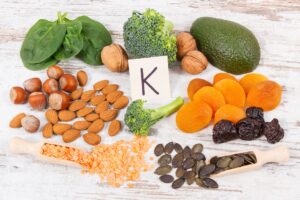
Bone fractures are a serious health concern, particularly for older women. According to the National Osteoporosis Foundation, 1 in 3 women over 50 will experience a bone fracture due to osteoporosis. Osteoporosis is a condition that causes the bones to become weak and brittle, making them more susceptible to breaks. In addition, older women are more likely to fall, which can lead to fractures. Fractures can cause significant pain and disability and can even be fatal in some cases. As a result, it is important for older women to be aware of the risk factors for osteoporosis and to take steps to prevent the condition.
For this new study, the team of researchers, in collaboration with the University of Western Australia, looked at the relationship between fracture-related hospitalizations and vitamin K intake in approximately 1,400 older Australian women over 14.5 years.
It was found that women who ate more than 100 micrograms of vitamin K1 were 31% less likely to have any fracture compared to those who consumed less than 60 micrograms per day which is the current intake guideline in Australia for women. One hundred micrograms are the equivalent of approximately 125g of dark leafy vegetables or one-to-two servings of vegetables.
The results were even more positive when looking at hip fractures. Women who consumed the most vitamin K1 reduced their risk of hospitalization by almost half (49%).
These results add to mounting evidence of the health benefits of vitamin K1, including previous studies that found it to enhance cardiovascular health.
Study lead Dr. Marc Sim explained, “Our results are independent of many established factors for fracture rates, including body mass index, calcium intake, Vitamin D status, and prevalent disease.”
“Basic studies of vitamin K1 have identified a critical role in the carboxylation of the vitamin K1-dependant bone proteins such as osteocalcin, which is believed to improve bone toughness.”
While many people may think consuming this much K1 is hard to do, it isn’t the case. It can easily be achieved by consuming between 75–150g, equivalent to one to two serves, of vegetables such as spinach, kale, broccoli, and cabbage each day.
Supporting Bone Health
As this study helps to show, supporting bone health is essential as you age. Bone Rescue can help to support the maintenance and development of bones thanks to its unique formula, including strontium. Chemically similar to calcium, strontium can provide great support for aging bones. Bone Rescue contains 680 mg of strontium along with additional ingredients to help keep bones strong and healthy